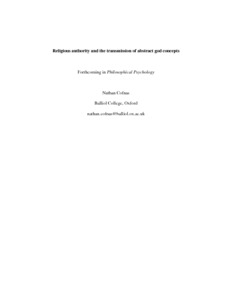Cofnas, Nathan
(2017)
Religious authority and the transmission of abstract god concepts.
[Preprint]
![[img]](https://philsci-archive.pitt.edu/14185/1.hassmallThumbnailVersion/Religious%20authority%20and%20the%20transmission%20of%20abstract%20god%20concepts%20%28N.%20Cofnas%29.pdf)  Preview |
|
Text
Religious authority and the transmission of abstract god concepts (N. Cofnas).pdf
Download (146kB)
| Preview
|
Abstract
According to the Standard Model account of religion, religious concepts tend to conform to "minimally counterintuitive" schemas. Laypeople may, to varying degrees, verbally endorse the abstract doctrines taught by professional theologians. But, outside the Sunday school exam room, the implicit representations that tend to guide people's everyday thinking, feeling, and behavior are about minimally counterintuitive entities. According to the Standard Model, these implicit representations are the essential thing to be explained by the cognitive science of religion (CSR). It is argued here that this theoretical orientation of mainstream CSR misses a whole dimension of religiosity—the acceptance of certain religious authorities, that is, the acceptance of other people's superior expertise. Average believers (especially in doctrinal traditions) tend to accept the authority of religious experts who espouse highly counterintuitive ideas that they (the laypeople) understand in a distorted form, if at all. These highly counterintuitive ideas are culturally successful because laypeople see them as being justified by people they have reason to regard as epistemic authorities. The tendency for people to endorse (without fully understanding) highly counterintuitive religious ideas espoused by intellectuals may explain parallels in the development of separate traditions (e.g., Judaism and Hinduism), as religious philosophers follow parallel lines of reasoning.
Monthly Views for the past 3 years
Monthly Downloads for the past 3 years
Plum Analytics
Actions (login required)
 |
View Item |



